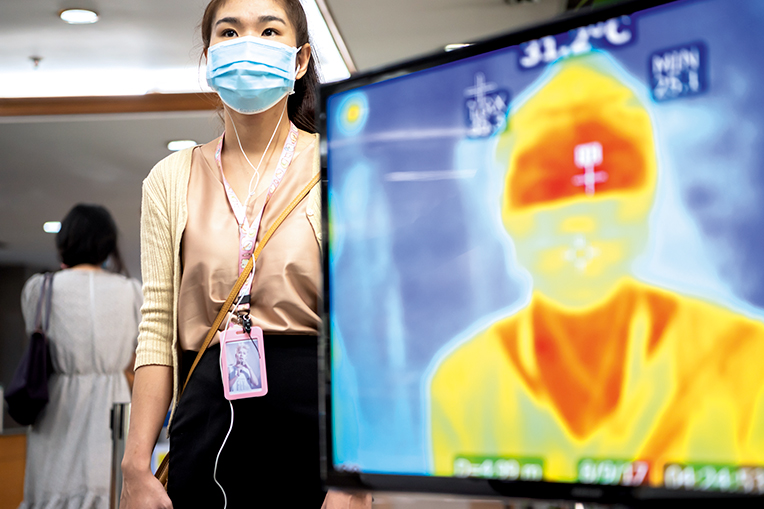 C
COVID-19 proves to be one of the most defining moments of our time. In just a span of 10 months since January 2020, it has significantly impacted businesses across the world. In Singapore, sectors that have been most affected are travel and hospitality. Consumer-facing sectors such as retail and food services have also been badly affected by the cutback in domestic consumption amidst progressively stricter safe distancing measures. Concurrently, outward-oriented sectors such as manufacturing and wholesale trade have been affected by the fall in external demand and supply chain disruptions, while domestically-oriented sectors like construction and real estate have been affected by negative spillovers arising from the downturn in the domestic economy. However, the bright spots in the economy are to be found with the rise in demand for online sales and services.
Singapore Standards Council (SSC) was set up by Enterprise Singapore (ESG) and works with industry, academia and government organisations to review and develop standards in Singapore. In the past year, ESG and SSC have developed and reviewed over 168 standards and technical references, impacting 13,000 organisations. 91 of these new standards were launched by March 2020, with about 70 per cent focusing on emerging areas such as smart manufacturing to support the adoption of Industry 4.0.
COVID-19 has also brought to the fore the importance of standards that focus on resilience for businesses to adapt quickly to disruptions. It has also emphasised the importance of the need for resource sustainability. Thus, in 2020, beyond efforts in new and emerging areas, ESG and SSC announced they will also focus on addressing industry needs and national initiatives by developing standards that build sustainable and resilient industries and enterprises. These include standards that mitigate the disruptive impact of COVID-19 and bolster recovery efforts.
Building greater resilience to support businesses
Business Continuity and Supply Chain
Business and Community Resilience
To help companies develop and activate business continuity plans and adapt to the changing landscape amidst the COVID-19 pandemic, the SSC adopted several ISO standards as Singapore Standards. ESG’s guide on business continuity planning for COVID-19, targeted at SMEs, was developed at the end of January 2020. ESG and the SSC have made available for free viewing over 40 international and Singapore standards across different areas to help enterprises mitigate the impact of COVID-19. The guide has since been downloaded 14,000 times and circulated to about 70 trade associations and chambers to disseminate to their members. Regardless of size or type, organisations are able to obtain accredited certification against these standards and demonstrate to legislators, regulators, and customers that they are adhering to good practices in business continuity management.
E-commerce
To support enterprises in leveraging online platforms, ESG and SSC launched the first national standard, Technical Reference TR 76 Guidelines for electronic commerce transactions in June 2020. The standard is aimed at bolstering SMEs’ online presence in the growing e-commerce market.
Information and Communications Technology (ICT) and Infrastructure
Biometrics and ID card
In the pipeline, consumers can expect a higher level of security and privacy in the standards of smart cards. The SSC plans to adopt International Organization for Standardization (ISO) standards for Biometric System-on-Cards, in which the acquisition of users’ biometric sample from fingerprints, face, iris or voice for verification purposes, could be executed within a smart card. No transference of data to any external terminal means higher security and privacy for users. Such cards are expected to receive high takeup rate for purposes of electronic payments and security access.
Air-conditioning and Mechanical Ventilation
Works are ongoing with Building and Construction Authority (BCA) to revise the SS 553 Code of practice for air-conditioning and mechanical ventilation in buildings, to take in new guidelines on how to deal with respiratory outbreaks and reduce the presence of the virus in buildings.
Healthcare Solutions
Supply and delivery of medication
In November 2019, SSC developed SS 644, a standard for the supply and delivery of medication to ensure consumers can get medicines sent safely to their homes. This was widely adopted by both public and private healthcare providers such as National Healthcare Group Polyclinics, KK Women’s and Children’s Hospital and Tan Tock Seng Hospital. Its timely launch saw the greater relevance and merit of SS 644 in supporting telemedicine during the pandemic, especially for elderly patients who were unable to go to pharmacies.
Digital healthcare provider such as WhiteCoat who adopted the standard on medicine delivery, were able to cope with the spike in demand during the pandemic and reduce express delivery time from 3 hours to 90 minutes. More importantly, they were able to implement uniform protocols so that medication integrity was preserved and could be delivered safely, securely and on time.
Thermal imagers
The SSC expanded its existing standard on mass temperature measurement using thermal imagers to include guidelines and examples for its use in public areas and commercial buildings. To ensure that thermal scanners have the capability to work with current technology, minimum specifications were required of such devices.
Developing sustainability-related standards
The SSC will also focus on emerging areas such as environmental sustainability, for new standards in the year ahead, as well as support ongoing industry transformation efforts. Green standards such as renewable power, energy storage and efficiency, and sustainable food production were identified as priorities for SSC in 2020 and 2021.
Renewables
Floating Solar Photovoltaic (PV) Power Plants
In 2019, an ambitious goal was unveiled for Singapore to install at least 2 gigawatt-peak (GWp) of solar photovoltaic (PV) power by 2030. To achieve this goal, a new standard is being developed to help developers, engineers and regulators design and deploy floating PV systems in a safe and effective manner for large-scale installations in Singapore’s reservoirs and seas near the shore.
Renewable Energy Certification
In support of Singapore’s shift to cleaner forms of power generation through Renewable Energy Certificates (RECs), guidelines have been developed on the measurement and verification of renewable energy generation, and on its issuance, use and management. RECs are tradable green energy attributes that represent units of electricity generated from renewable energy generation facilities. The guidelines will improve the accounting, traceability and transparency of RECs issued as claimed in Singapore, and support companies in their environmental sustainability targets.
Energy Storage and Efficiency
Grid-integrated Electrical Energy Storage (EES) System
As Singapore steps up its efforts towards energy sustainability, the implementation of Electrical Energy Storage (EES) System aims to facilitate the widespread deployment of solar energy and build up local capabilities to benefit from the growing opportunities in the EES market. As such, two new standards are being adopted to support safe deployment, avoid costly redesign during system integration or post-commissioning, and shorten the debugging time for any new Electrical Energy Storage (EES) deployment.
Energy efficiency of equipment and systems
The SSC is developing a standardised measurement methodology to track the long-term energy efficiency of compressed air systems. This standard aims to encourage the adoption and development of more energy efficient compressed air equipment and systems in Singapore.
Sustainable Production
Clean and green urban farms
The upcoming standards on clean and green urban farms for agriculture and aquaculture can be used to certify urban farms that have established a sustainable farm production system. The standards allow certified farms to brand their farm produce and encourages the use of sustainable good practices in the local farming industry. One such example is the certification that no pesticides are used in vegetable farming.
Good agriculture practices
The new standards, applicable to vegetable farms, food fish farms and poultry layer farms have two intended outcomes – to support the responsible use of chemicals, antibiotics and pesticides for the local farming community, and to align to the standards of farming communities within ASEAN member states. This will enhance trade flows and reduce compliance costs for the expansion of business operations within the ASEAN region.

